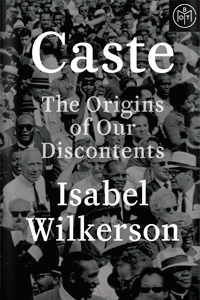

History
Caste
by Isabel Wilkerson
Quick take
A look at racism and caste, in America and abroad, that goes beyond what you learned in history class.
Good to know
400+ pages
Literary
Critically acclaimed
Serious
Synopsis
In this brilliant book, Isabel Wilkerson gives us a masterful portrait of an unseen phenomenon in America as she explores, through an immersive, deeply researched narrative and stories about real people, how America today and throughout its history has been shaped by a hidden caste system, a rigid hierarchy of human rankings.
Beyond race, class, or other factors, there is a powerful caste system that influences people’s lives and behavior and the nation’s fate. Linking the caste systems of America, India, and Nazi Germany, Wilkerson explores eight pillars that underlie caste systems across civilizations, including divine will, bloodlines, stigma, and more. Using riveting stories about people—including Martin Luther King, Jr., baseball’s Satchel Paige, a single father and his toddler son, Wilkerson herself, and many others—she shows the ways that the insidious undertow of caste is experienced every day. She documents how the Nazis studied the racial systems in America to plan their out-cast of the Jews; she discusses why the cruel logic of caste requires that there be a bottom rung for those in the middle to measure themselves against; she writes about the surprising health costs of caste, in depression and life expectancy, and the effects of this hierarchy on our culture and politics. Finally, she points forward to ways America can move beyond the artificial and destructive separations of human divisions, toward hope in our common humanity.
Free sample
Get an early look from the first pages of Caste.
Why I love it
Glory Edim
Founder, Well-Read Black Girl
In this cultural moment, I can’t think of a more resonant and urgent read than Caste, Pulitzer Prize-winning author Isabel Wilkerson’s extensive interrogation of racism in America and abroad.
Wilkerson argues that there is an unspoken force controlling Americans, one with far-reaching and profound effects, writing that, “If we have been trained to see humans in the language of race, then caste is the underlying grammar that we encode as children.” Drawing on two of the best-known caste systems in history—in India and Nazi Germany—as a lens for understanding how the abuses of power, privilege, and oppression intersect, she makes the case that we are all bound to a caste system that perpetuates rampant inequality in our society. Along the way, she offers us detailed narratives of disenfranchisement—like explaining why Americans rallied to watch public lynchings in the Jim Crow South—and with each historical example, we are left with a better understanding of how the caste system shows up over and over again in our country.
Caste: The Origins of Our Discontents is an extraordinarily powerful and thought-provoking work. Wilkerson sets out to educate her readers, challenging us to go further beyond race 101. Ultimately, her outlook is hopeful: Wilkerson believes that with enough knowledge and honest indignation, we can successfully confront our history, acknowledge that Black Lives Matter, and dismantle oppressive caste systems.

